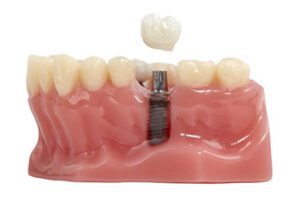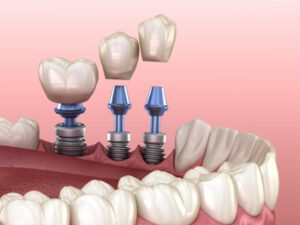Are you considering getting a single-tooth dental implant but are unsure of the costs associated with it? Whether you’re looking to restore your teeth’s functionality and aesthetic or need to get your teeth replaced, understanding the cost of a single tooth implant is essential.
From the initial consultation with your dentist to aftercare, we’ll walk you through the factors contributing to the total cost of dental implants costs.
What is the Cost of Single Tooth Implant?
Missing a tooth can be a real confidence killer and highly restrictive when it comes to certain foods. However, dental implants are a solution to replacing one or more teeth, meaning you can once again feel comfortable smiling, eating, and engaging in everyday activities.
Dental implants have become the go-to for tooth replacement in the modern world. They are inserted into your mouth like a screw and act as the artificial tooth root to mount the new tooth. However, people most frequently ask, ‘How much do dental implants cost?’
Dental implant costs vary depending on various factors, including the tooth implant type and the tooth’s location. However, the cost of a single tooth implant starts at around $3000. Once you get a mouth implant, you will have a healthy and fully functioning tooth that looks and functions like a real tooth, making it worth the financial investment.
Are you a Candidate for Dental Implants?
If you’re struggling with missing or damaged teeth, you may have considered dental implants as a solution. But are you a good candidate for this dental procedure? It all depends on the health of your gums, gum tissues, and adjacent teeth.
If you suffer from dental health issues such as gum disease, your dentist may recommend treatment before moving forward with implants. Additionally, if you have nearby teeth that are in poor condition, it may not be feasible to place implants without causing further damage.
However, dental implants may be a great option to explore with your dentist if your dental health is in good shape and you’re looking for a long-lasting solution for missing teeth that doesn’t require a root canal.
Factors that Affect Dental Implant Cost

Older patients, for example, may require additional diagnostic procedures, such as CT scans, that can increase the cost. Similarly, location plays a big role in determining the price tag – implant procedures in large cities are often costlier than those in rural areas.
Then there’s the type of implant itself – there are different options with varying costs. Generally speaking, the cost to replace missing teeth with an implant typically ranges from a few thousand to several thousand dollars. However, with the right dental insurance or payment plan, the cost doesn’t have to be a barrier to restoring your smile.
Comparison Between Short-term and Long-term Results
Patients often wonder about the difference between short-term and long-term results when replacing missing teeth. With options like mouth implants, it’s important to consider the long-term effects on your upper and lower jaw.
While a quick fix may seem tempting, remaining natural teeth can shift over time, causing problems like misalignment. Long-term solutions like implants provide stability and prevent these issues from arising.
Plus, investing in a long-term solution means you won’t have to worry about replacing missing teeth repeatedly. So why settle for a temporary fix when a long-term solution can give you a healthy, happy smile for years to come?
Advantages of Getting a Tooth Implant
Having single or multiple teeth that are missing can make life challenging, but with modern technology, receiving dental implants has never been easier. Not only do implants look natural, but they can improve your lifestyle and quality of life in numerous ways.
For one, they give you the confidence to smile and speak easily, boosting your overall self-esteem. Dental implants are permanent, so you won’t have to worry about replacing them. Investing in tooth implants can be a life-changing decision that improves oral health and happiness.
Does Insurance Cover Dental Implants?

It’s important to check with your medical insurance provider to review the plan you’re subscribed to. Remember that the cost of a single-tooth implant can be high, so it’s always good to know what your dental health insurance benefits will cover.
Ultimately, the financial investment of mouth dental implants can be daunting, but the benefits and aesthetic improvements can make it worth it for many patients.
Payment Options for Dental Implants
Dental implants can be transformative for people suffering from missing or damaged teeth but can come with a hefty price tag. Many people assume that they can’t afford this type of dental treatment. However, the truth is that plenty of payment options are available to make it accessible to almost anyone. Here are some of the most popular ways to pay for dental implants. From insurance coverage to financing, we’ve got you covered.
Insurance Coverage
The first step in determining how to pay for dental implants is to find out if your insurance plan covers them. In many cases, insurance will provide some coverage for dental implants, although it may not cover the entire cost. The amount of coverage you receive is contingent on the specifics of your plan, so be sure to review your policy carefully. If your plan does not cover implants, don’t worry – other options are available.
Financing
Financing is a popular option for those who need to pay for dental implants over time. Look for a dental practice that offers financing plans with monthly payments, as that can make it easier to manage the cost of treatment. Before signing up for financing, review the terms carefully and ensure you understand the interest rates and any fees associated with the plan.
Personal Loans
Some patients choose to take out personal loans to pay for their dental implant treatment. You can obtain personal loans from banks, credit unions or online lenders, and they are typically repaid over a fixed term with a fixed interest rate. While personal loans can be a good option for those with good credit, they may not be available to everyone.
Savings
Finally, one of the simplest payment options for dental implants is to pay for them out of savings or other sources of funds. While this may not be feasible for everyone, it can be a good option for those who have been saving for a rainy day or who have received an inheritance or other windfall.
The Dental Implant Procedure: What to Expect
Knowing what to expect during the procedure is important if you’re considering getting dental implants. While the process can initially seem daunting, understanding the steps involved can help alleviate your fears or concerns. In this blog section, we’ll guide you through each stage of the dental implant procedure.
Stage 1: Consultation and Planning
Before the dental implant procedure, the dentist examines your mouth and takes X-rays and 3D images to determine if you’re a suitable candidate for dental implants. Your dentist will also use this time to develop a plan of action for your implant procedure. This is crucial because each patient’s needs are different, and a customised plan will ensure the best outcome for your oral health.
Stage 2: Implant Placement Surgery
Dental implant placement surgery is usually performed under local anaesthesia. The dentist will make an incision in your gum till the jaw bone is exposed and then drill a hole to insert the implant into the bone. The implant is then covered with a protective cap to allow it to fuse with the bone over time. Depending on the number of implants needed, the surgery can last from one hour to several hours.
Stage 3: Osseointegration
After the dental implant surgery, you need to wait for several months for osseointegration to take place, which is when the implant fuses with the jaw bone. This fusion process ensures a strong and stable anchor for your dental prosthesis. It’s important to take care of yourself during this period and avoid any hard or crunchy foods.
Stage 4: Abutment Placement
Once your implant has fused with the bone, you’ll need a second surgery to place the abutment on the implant. The abutment is what joins the implant and the dental prosthesis (crown, bridge, or denture). Your dentist will make a small incision in your gum to expose the implant and attach the abutment.
Stage 5: Crown Placement
The final stage of the procedure involves the placement of the dental crown. The dental crown is customised to fit your mouth perfectly, and your dentist will ensure proper alignment and a secure fit. Once placed, your dental implant will feel just like a natural tooth.
Aftercare Advice
Congratulations on successfully obtaining a new tooth implant! Now it’s important to understand how to take care of it properly. After the implant has been installed, the jaw bone will naturally grow and adhere to the implant over time.
After the procedure, you must follow the advice provided by your dentist to ensure the implant sets firmly. These guidelines will provide step-by-step instructions on how to properly brush and floss your new implant and what food and drink to avoid. By prioritising oral upkeep, you can help ensure successful implantation and maintain a healthy smile for decades to come.
Alternatives to Getting a Tooth Implant
Getting a tooth implant is often seen as a lifetime investment that is worth it. However, the final cost can be a deterrent for some. Fortunately, there are alternatives available that may be less expensive. One option is to consider getting implant-supported dentures.
This approach can provide a secure and natural-looking solution that is less expensive than individual implants. Another option is looking into false teeth, which can be made to fit comfortably and match the appearance of real teeth.
It’s important to note that while these alternatives may be less pricey in the short term, they may require more maintenance over time. Ultimately, discussing options with your dentist can help you decide the route you should take according to your needs and budget.
Key Considerations Before Deciding on Treatment

Your dentist may need to perform bone augmentation before the procedure, adding to the overall cost and healing time. It’s best to consult with a dentist who can comprehensively assess you and recommend the best treatment plan for your needs.
Therefore, you should ask detailed questions at your initial consultation to understand the procedure, its success rate, and potential complications and make an informed decision accordingly.
In Summary
Though tooth implants are a relatively expensive tooth replacement option, they can still give you tremendous benefits. Knowing what affects the cost of a single dental implant and exploring financing options is worthwhile as it will help you make the ideal choice. Regarding long-term versus short-term results, a single implant may offer greater value for money.
The advantages of getting an implant far outweigh any potential risks, so pay attention to aftercare advice to prevent issues down the line. But if you’re still worried about the price or don’t wish to pursue tooth implants, alternatives, such as dentures or bridges, might fit your budget better.
For peace of mind, consult Balmoral Dental Centre before committing yourself to a procedure. Our team can advise you and find solutions tailored to your specific needs! Contact our dental office to book an appointment today- simply call (07) 3113 9789.
Note: Any surgical or invasive procedure carries risks. Before proceeding, you should seek a second opinion from an appropriately qualified health practitioner.
References:
https://www.smile.com.au/dental-treatments/implants
https://www.mayoclinic.org/tests-procedures/dental-implant-surgery/about/pac-20384622
https://www.perio.org/for-patients/periodontal-treatments-and-procedures/dental-implant-procedures/

